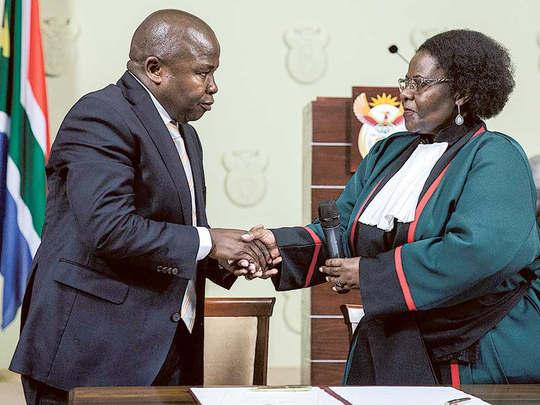
Cape Town: If the appointment of South Africa’s new finance minister has alarmed investors, it may be because they’ve never heard of him.
The rand plunged late on Wednesday after President Jacob Zuma announced that ruling party lawmaker David van Rooyen will replace Nhlanhla Nene, who held the post for less than two years. The currency fell as much as 5.4 per cent against the dollar, hitting a record low of 15.3857.
“I know nothing about the new man,” George Herman, head of South African investments at Cape Town-based Citadel Investment Services, said by phone. “I’ve never heard of him or dealt with him before. The markets are not going to like this.”
While Nene sought to contain spending, his efforts were often frustrated because Zuma’s administration had other higher priorities. The outgoing finance chief clashed with some government colleagues over pay increases for workers, proposals to build a nuclear power industry and plans to expand the state carrier, South African Airways.
“In my view, Nene was clearly axed because he failed to do Zuma’s bidding when it came to managing SAA and funding for proposed new nuclear plants,” said Peter Attard Montalto, an economist at Nomura International Plc, from London. Van Rooyen is “a pure political appointment. We are worried about the fact he has no central or provincial government experience.”
Zuma gave no explanation for removing Nene, saying only that he had “done well since his appointment as minister of finance during a difficult economic climate” and will be moved to another key role.
No Reason
“There’s no reason to remove Nene, there’s no reason to appoint this person,” Nazmeera Moola, economist and strategist at Investec Asset Management in Cape Town, said by phone. “It will create uncertainty in the market, so it’s clearly negative.”
South Africa’s economy is already struggling, as the price of gold and other key exports plunges. On Dec. 4, Fitch Ratings Ltd. downgraded the country’s credit rating to BBB-, one level above investment grade, while Standard and Poor’s cut the outlook on its equivalent rating to negative, bringing the nation a step closer to junk status.
“We are not so concerned about the person but rather whether Treasury controls the line on fiscal deficits and the debt stock,” Ravi Bhatia, director of sovereign ratings at S&P, said in an emailed response to questions.
Financial background
Van Rooyen, known as Des by his colleagues, is a former mayor of Merafong municipality in the central Gauteng province who now serves on parliament’s finance committee and the African National Congress’s economic transformation group. He didn’t answer calls to his mobile phone.
He became involved in politics in the 1980s and joined the armed wing of the ANC during its struggle against white minority rule. Van Rooyen held several leadership positions in the party after it took power in the first all-race elections in 1994, according to the website of the People’s Assembly, a group that monitors parliament. His qualifications include a master’s degree in public development and management and another in finance from the University of London, the website said.
Van Rooyen has routinely delivered politically charged speeches and never addressed pressing economic issues, such as fiscal consolidation, according to David Ross, a lawmaker with the main opposition Democratic Alliance.
“I have known him since 2009,” Ross said by phone. “I believe he will be all lost at sea in this new post.”
The ANC said in an email statement on Thursday that van Rooyen had the necessary experience to lead the finance ministry.










